
(Photos: Jonathan Maus)
Portland’s 48th Police Chief doesn’t ride a bike because she thinks it’s too dangerous. But her path to pedaling began last night.
Danielle Outlaw shared her fear of cycling in traffic and other thoughts with a small group of people at an invite-only reception hosted by The Street Trust at their headquarters on NW Glisan Street in Old Town last night.
“There are a lot of folks who want a say — but at some point we’ve got to get stuff done.”
— Danielle Outlaw, Portland Police Chief
The event was billed as a way for donors and partners of the organization to meet Chief Outlaw and ask her questions about how her work intersects with transportation issues.
Outlaw has been in her position for seven months, and although she lives just a short drive (six minutes by her estimate) from work, she hasn’t gotten up the courage to go by bike. As if wanting to clear the air from the outset, Outlaw shared with the audience, “I don’t feel comfortable riding on the streets just yet. I actually never have.” She insisted it wasn’t a Portland thing (“I brought this [feeling about biking] with me,” she’d say later) and she also sounded willing to give it a try.
Her inspiration appears to have come in large part from an anonymous young boy she saw biking one morning on her way to work. “He was just five or six years old,” Outlaw shared, “And I’m there with my mom hat on, wondering if his mom or dad is riding alongside him because I was so nervous for him. But he didn’t care. He was so cautious. He crossed the street, in the bike lane… and he did it! And I thought, gosh, if he can do it, I can do it.”
Outlaw specifically mentioned the possibility of riding on Bike to Work Day on May 18th. The Street Trust Board Member David Forman pounced on that opening and offered to lead her on a ride if she was interested (stay tuned).

Becoming a bicycle rider will surely not be the toughest thing Outlaw tackles as she becomes a bona fide Portlander.
Asked about the biggest adjustment she’s had to make since being here, Outlaw gave an answer many readers of this site can relate to: “It’s the ‘Portland polite’ thing,” she said. “I’m learning to navigate through that. I’m very inclusive, process-wise, but because of the Portland polite and the fact that we’re very process-driven, there are a lot of folks who want a say — but at some point we’ve got to get stuff done.”
Advertisement
Asked what could be done to bring speeds down, Outlaw alluded to the bureau’s staffing levels. “The question is, what can we do better to make sure we are visible when we don’t have a physical presence? If we have a photo radar somewhere, what is the follow-up?” Outlaw also talked up the importance of raising awareness and working with other agencies and partners. After officers do an enforcement mission, for instance, she wants to know: “How are we relaying the message to the community that this [enforcement] happened? All these people got cited, now here’s why this can happen to you. Messaging is huge. There are so few [officers], we can only be in so many places at one time.”
PPB Traffic Division Captain Mike Crebs joined Chief Outlaw at the event. As we’ve reported recently, Capt. Crebs has emerged as a strong champion for safe streets. He’s a member of the Vision Zero Task Force and has testified in support of Transportation Bureau policies numerous times.
“The speed issue is near and dear to my heart,” Crebs said last night as he followed-up on comments from his Chief. When he said, “I’d really love if the City of Portland had the ability to set its own speed limits,” referencing the fact that State of Oregon currently has that authority, the entire room erupted in applause.
But of course traffic laws and speed limits must be coupled with an effective enforcement strategy. Chief Outlaw insisted on several occasions last night that all PPB enforcement decisions are “made through an equity lens.” She said she expects all her officers to engage in community policing and that she wants implicit bias training bureau-wide.

The Street Trust took an important step in hosting this event last night. It’s long past time to rebuild and strengthen ties between transportation advocates and the police bureau.
In the past few years street safety has slipped as a political priority as other serious crises like homelessness, housing affordability, police use-of-force, and social justice issues have dominated headlines and council agendas. Mobility and safety on public streets intersects with many of those issues, and building bonds in our community to tackle them is critical if we want to “get stuff done.”
Last night The Street Trust Executive Director Jillian Detweiler told Outlaw that the existing Transportation Community Policing Agreement (passed in 2009) “has atrophied.” As I shared in a 2015 post that outlined several steps City Hall could take to improve bike safety, I absolutely agree.
Chief Outlaw will hopefully oversee big changes at the PPB. Transportation reform advocates need to be part of them. Last night was a good start.
— Jonathan Maus: (503) 706-8804, @jonathan_maus on Twitter and jonathan@bikeportland.org
Never miss a story. Sign-up for the daily BP Headlines email.
BikePortland needs your support.

